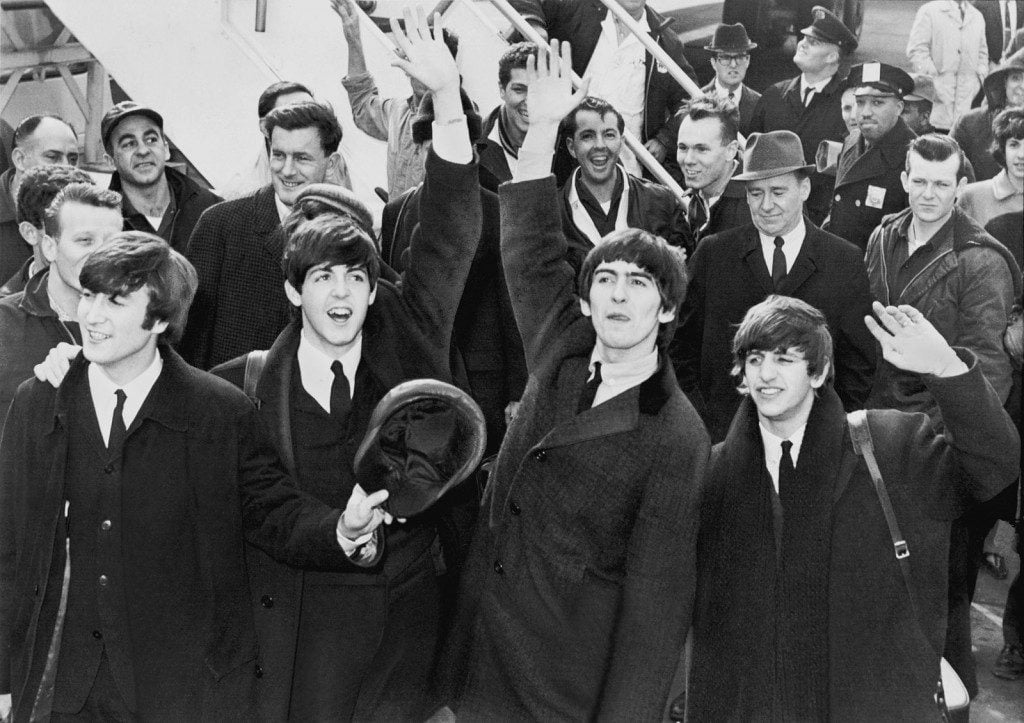
Wikimedia Commons public domain
I published the following article in the Deseret News back on 16 August 2012:
I was surprised, puzzled and even a bit shocked to see the London Symphony Orchestra and the Liverpool Philharmonic Youth Choir showcase John Lennon’s atheist anthem “Imagine” during the closing ceremonies of the 2012 Summer Olympic Games.
And that white death-masklike portrait of Lennon in the center of Olympic Stadium? Pretty ghastly — and especially so when it dissolved (decomposed?) at the end of the song. But that’s a separate issue.
Don’t get me wrong: Sadly, while I attended many California rock concerts featuring such Lennon contemporaries as the Byrds, Iron Butterfly, B.B. King, Cream and the Rolling Stones, I never saw the Beatles in a live performance. But I’ve been a wildly enthusiastic fan almost all of my life, and John Lennon was far and away my favorite of the four. (Living in Cairo, Egypt, when the shocking news of his death arrived, I felt as if Mark David Chapman had also murdered my youth.)
Still, “Imagine” is a silly song, and, surely, to at least a substantial proportion of those who watched and participated in the Olympics, it’s a potentially offensive one. Consider these lyrics:
Imagine there’s no heaven.
It’s easy if you try.
No hell below us,
Above us only sky.
Imagine all the people
Living for today.
Imagine there’s no countries.
It isn’t hard to do.
Nothing to kill or die for,
And no religion, too.
Imagine all the people
Living life in peace …
You may say I’m a dreamer.
But I’m not the only one.
I hope someday you’ll join us,
And the world will be as one.
First of all, Lennon’s projected utopia seems … well, rather dull. Nothing worth dying for? No great loyalties, passions or affections?
Living only “for today”? No long-term goals? No aspirations or ambitions? No dreams? No great achievements against the odds? That, I suspect, would pall pretty quickly.
The Olympic athletes in that stadium certainly didn’t get there by just wandering aimlessly into the Games. They reached it through long, disciplined, goal-oriented effort. So did the musicians who performed, the cameramen who filmed the ceremony and the technicians who oversaw its broadcast. The stadium itself certainly wasn’t conceived and built by people merely “living for today.”
Much more importantly, though, there exists little if any evidence to demonstrate that, were religion only to disappear, we’d all live in peace, love and brotherhood. Consider, for example, the historical record of such officially atheistic regimes as Stalin’s Russia, Mao’s China, Pol Pot’s Cambodia and Castro’s Cuba, or, for that matter, of Citizen Robespierre’s revolutionary France. Their victims total many scores of millions. And while Nazi Germany represents a more complex (and perhaps altogether incoherent) case, Hitler’s dismissal of humankind as “a ridiculous cosmic bacterium” doesn’t exactly sound like orthodox Christianity or even theism.
“Imagine there’s no heaven,” sings Lennon, but “above us only sky.” Now, it happens that another well-known song also celebrates the blankness of the sky above us given the supposed absence of God. A scene in the musical “Les Misérables” features the cruel and thoroughly unscrupulous innkeeper Thenardier stealing through the dark sewers of Paris. Happily despoiling the corpses of the idealistic young students massacred earlier in the day, he, too, finds it liberating to imagine that there’s no God:
It’s a world where the dog eats the dog,
Where they kill for bones in the street.
And God in His Heaven,
He don’t interfere,
‘Cause he’s dead as the stiffs at my feet.
I raise my eyes to see the heavens,
And only the moon looks down.
The harvest moon shines down!
What would a wholly godless society be like? We don’t know. But many would surely regard an empty heaven as a blank check to do evil.
The 19th-century poet Eliza R. Snow recalled that, before she found Mormonism, “ofttimes a secret something whispered, ‘You’re a stranger here,’ and I felt that I had wandered from a more exalted sphere.” The ancient Saints, too, says the epistle to the Hebrews, felt themselves “strangers and pilgrims on the earth” (11:13).
Perhaps John Lennon sensed the same truth. Though rejecting heaven, he longed for peace and unity, for an end to greed and hunger. Despite his confused exhortation simply to “live for today” in this world, he was dissatisfied with the actual world in which he found himself. He yearned for more. And in that sense, he was more right than he knew.












